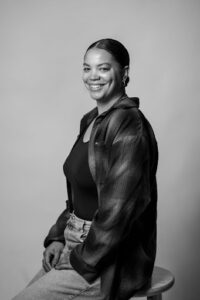
By Tihut Tamrat, Voice & Viewpoint Staff Writer
The film “Sacred Soil: The Piney Woods School Story” directed by San Diego’s very own JJ Anderson, premiered on Hulu on February 23, 2024. The film tells an inspiring story about the history of Black educational institutions in America and how the last Black standing boarding school, Piney Woods School, is more than just an institution. It is in fact, “the epitome of resilience and hope,” according to William Crossley, President of Piney Woods School.
The film documents the history of Piney Woods through the present testimonies and lives of the “incredibly self aware and brilliant” students that attend the school. JJ Anderson, coming of age film documentarian, tells us what the journey was like in making the film in an insightful Q&A email interview.
The production process was intense, challenging, and liberating. Making a production schedule work with a school schedule rarely worked out the way we expected and pushed us to be innovative. When things don’t work out the way you intended them to you are forced to release and be present. This production taught me that you don’t always get what you want, but you do get what you need and that’s what’s most important.
However, she tells us that her road to becoming a film director was not a traditional one.
I don’t share the traditional background many filmmakers have in terms of education or training. My love for storytelling was ignited while sitting in my parents’ AA and NA [Alcoholics Anonymous and Narcotics Anonymous] meetings as a young girl. I’d quietly observe and listen in as vulnerable and often charismatic adults shared their most intimate thoughts with the group. What stood out to me most were the transformative properties of exchanging thoughts and dialogue. It was almost as if you could see a person being instantly uplifted through the small, but meaningful act of offloading what was on their mind and taking in the stories of others. It was fascinating to me even at that young age and I think it’s something I’ve been chasing my whole life.

She eventually went to college and graduated with a degree in Economics, and soon co-funded a production company called HRDWRKER. Through her production company and working as a model and tv talk show host she was able to build up her portfolio as a documentarian.
Her mother was a well-known activist in San Diego in the 90s-2000s and her father made his stamp on San Diego County through building rehabilitation and community programs in partnership with the District Attorney’s Office without the college education most would require to do so.
“While many others took the conventional route, in my family, thinking outside of the box with an attachment to a greater purpose was always ingrained in us. Whatever lived within me at the time had no desire to be a part of tradition and I think San Diego was the perfect place for me to explore that safely at a critical age.”
When asked what it was like to be raised Black in San Diego, she says she was surrounded by a multitude of cultures, learning and exchanging ideas with friends.
It gave me a sense of understanding around race-driven constructs outside of my own and how those show up in our day-to-day lives. I was a Brown girl who identified as Black who often found herself in uncomfortable White spaces.
She sought refuge, she says, amongst her Black and Brown peers.
“It took me going to Tuskegee University to really appreciate my Blackness and the layers of Black culture.”
Something that really translated in “The Piney Woods Story”.
Being from the West Coast, making a film in the South with its deep roots in slavery had its challenges.
I was hyperaware of the stereotypes and negative stigmas that are shaped around Mississippi. I have family in North Carolina and spent many summers there as a child and young adult. While North Carolina and Mississippi are worlds apart in many ways, I felt prepared. I did my best to remain open. As a documentarian, my job is to observe, investigate, and support. That’s exactly what I did.”
And that she did. She produced a beautiful film that acknowledges the many ways there are to be Black in America, allowing every student to have a voice. William Crossley’s mission statement, to “develop a child through their heads, hearts and hands” shows the importance of Piney Woods, that “without the place there is no place for people to come and without the people, the place loses its meaning and its resonance.”
JJ Anderson leaves us with her purpose behind it all: “The work that Piney Woods school does is incomparable. I just want people to be aware of it. Support Black educational institutions, support Piney Woods, they are vital to our success as a whole.”

